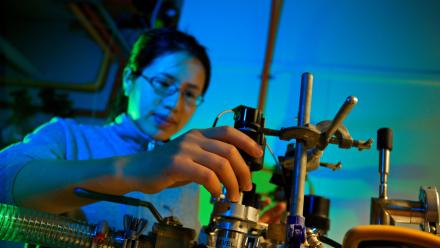Quantum storage breakthrough key to 'unbreakable' encryption

Researchers at the Australian National University (ANU) believe that the development of a quantum hard drive that can store data for up to six hours is a major step towards a secure worldwide data encryption network based on quantum entanglement.
Scientists from ANU and New Zealand's University of Otago have jointly developed an optical quantum hard drive constructed of atoms of rare earth element europium embedded in a crystal.
The solid-state drive employs quantum entanglement -- in which pairs of particles exist in linked states -- to store data.
Quantum entanglement has long been held up as a holy grail for the development of super-fast computers that rely on qubits rather than traditional binary data, but the entangled state of particles used to store data has traditionally been difficult to maintain for any usable length of time.
"Quantum states are very fragile and normally collapse in milliseconds," said the ANU Research School of Physics and Engineering's Manjin Zhong, who is also the lead author of an article on the research published by science journal Nature.
Latest Australian news
The research conducted by the team of researchers in Australia and New Zealand demonstrated six-hour quantum storage using the prototype optical drive.
Zhong said that the quantum storage breakthrough demonstrated by the team could not only provide new data storage opportunities, but could also be used to "perfectly secure encryption for data transmission".
"Our long storage times have the potential to revolutionise the transmission of quantum information," she said. "Our experiment shows that it is now possible to think of extending the range of quantum communication by storing entangled light in separate memories and then transporting them to different parts of the network.
"We believe it will soon be possible to distribute quantum information between any two points on the globe," she said.
According to the researchers, quantum information promises "unbreakable" encryption, because quantum particles, such as photons of light, can be created in a way that intrinsically links them.
Interactions with either of these entangled particles affect the other, no matter how far they are separated.
Now, Dr Jevon Longdell of the Dodd Walls Centre for Photonic and Quantum Technologies at the University of Otago wants to push the quantum storage time even further.
"Our goal is to extend this storage time out past a day. Once we reach this target, we believe it will be possible to physically distribute entangled quantum states between any two points on the globe," said Longdell.
Current quantum communication networks are limited to distances of about 100 kilometres, according to Longdell.
"You can distribute the entangled pairs of quantum states literally in a box sent via the post," he said. "Then use these entangled pairs to come up with a shared secret key, and then use this secret key to do the communication.
"By comparing the results with your friend, you can come up with a secret that only you two share. The neat thing is that we have discovered you can do this comparison without a secure channel," he said.
The team's research comes five months after Google announced it would launch a new research project in partnership with the University of California Santa Barbara to build quantum processors designed for artificial intelligence applications.